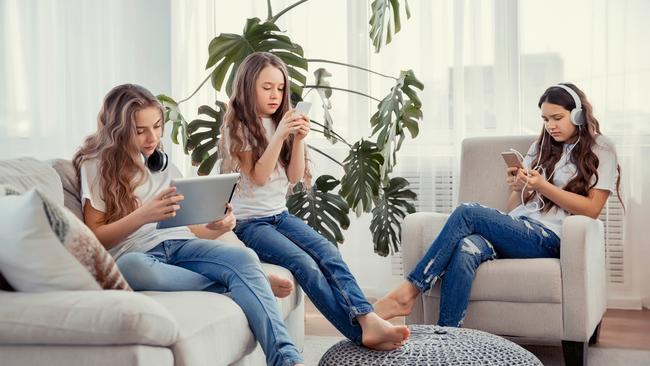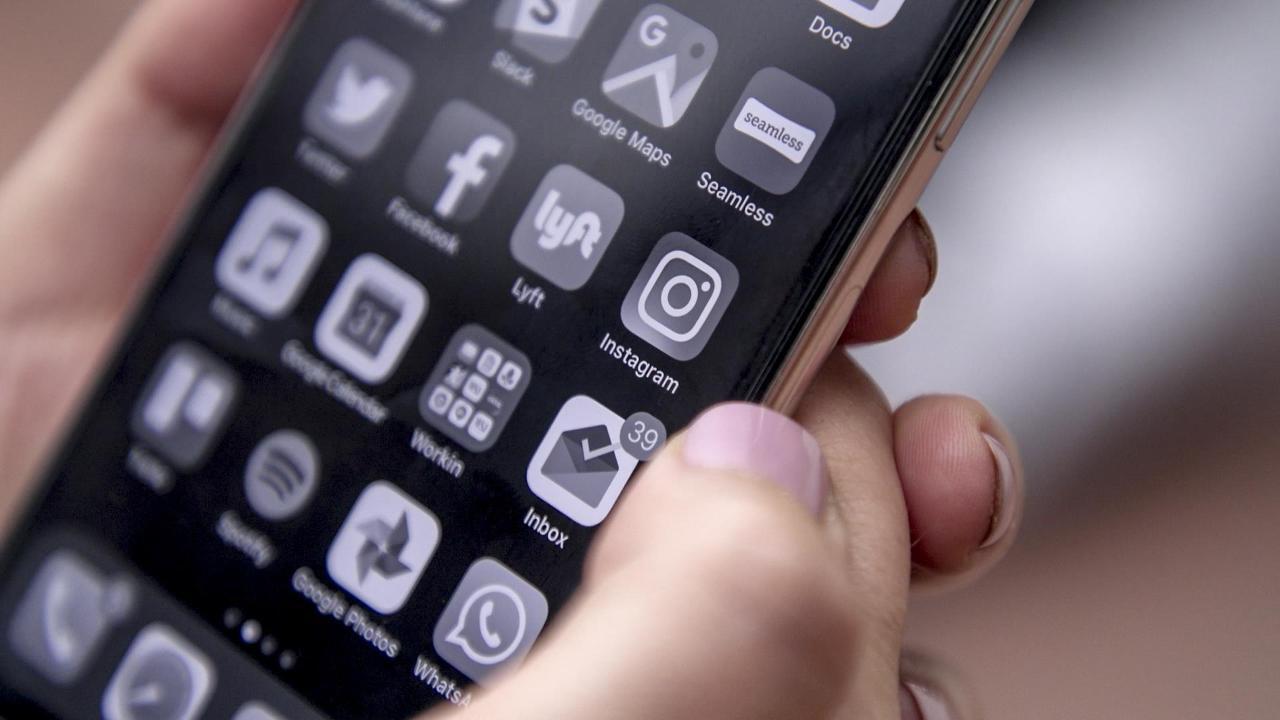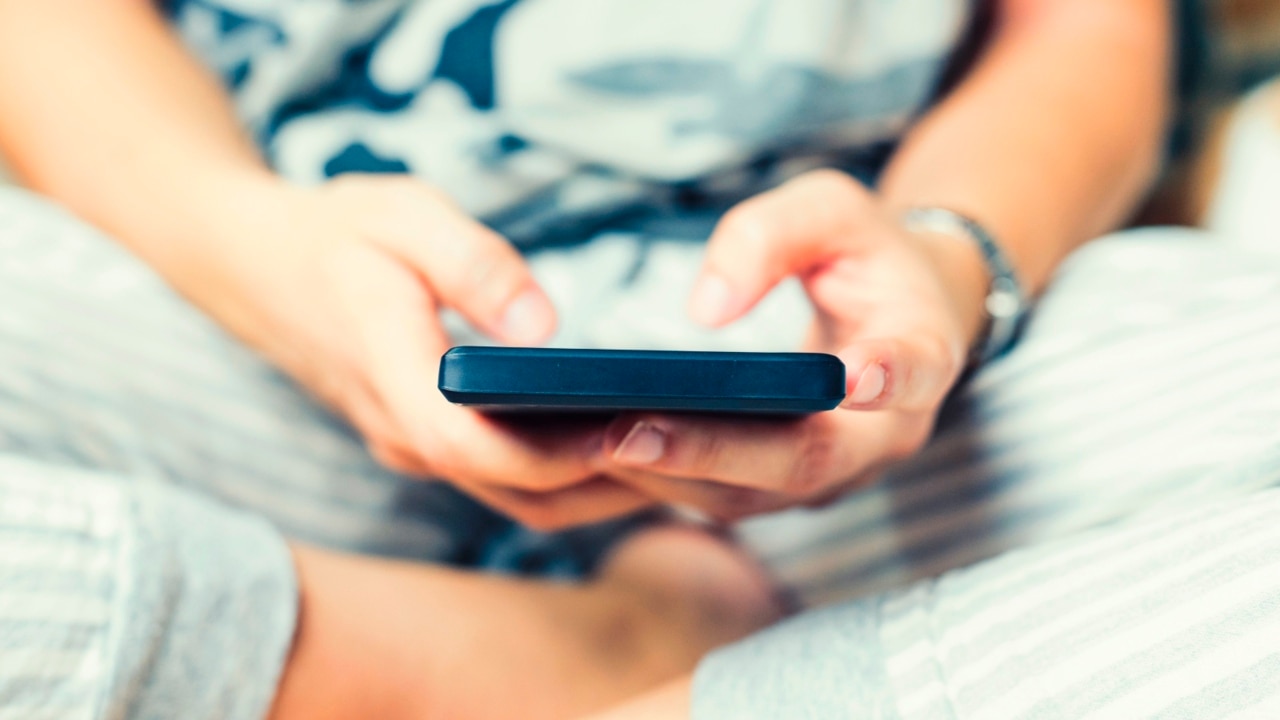Kids on mobile phones: how do we break the screen addiction when adults are just as bad?


We smoked everywhere – in planes, in restaurants, at work, in the car, on the street, in the kitchen, in the bedroom – as hooked as any 13-year-old on a mobile phone.
It took years for some to break the habit, years of nicotine patches and nicotine chewing gum, of therapy, of cold turkey. Now so uncool, smoking was on point back in the day – sophisticated, tough, worldly, classless and, most of all, widely accepted for decades even as its noxious impact was revealed and publicised.
It seems so long ago, but worth a reminder in the week when the new Labor government in NSW made good on an election promise to ban students from using mobile phones in government schools during school hours.
This is a good move – one that’s already in place in some other states – one that 99.9 per cent of parents are likely to welcome even if it makes it slightly trickier to tell the boy his grandmother, not his mother, is collecting him at the school gate today.
But for most parents the ban is a gift from their politicians they thought they would never get: societal-wide support to back their individual efforts to get their children off their devices for at least a few hours a day.
It’s a moment of public-private intersection that puts mobile phone usage up there with seat belts and polio vaccination.
You might protest individual freedoms but the state has spoken on this one.
For many parents, the fight to get their children to walk away from the phone is a lonely one: no matter the rules and values attempted at home, the zeitgeist is against you. Even principals and teachers who have wanted to implement restrictions have found it difficult to enforce in the absence of clarity.
Breaking a mobile phone addiction in our kids is doubly difficult when most parents, indeed most adults, know they are the worst possible role models.
We tell the youngsters among us to get outside and climb a tree while we scroll Facebook and Twitter and our news feed.

We don’t go to school, so we avoid the ban there, but just about everywhere else checking the phone has become for many the default action.
Just like cigarettes, it only takes a minute to light up and be transported to a slightly different reality. We have grown used in the past 20 years or so to filling any free moment with the internet, to checking if someone has phoned or messaged or if something – an earthquake, a flood, a divorce, an anything – has happened, anywhere. No more wasted minutes staring into the middle distance as we wait for a bus or an Uber; not a second of boredom; or a fraction of loneliness if we can reach for the phone and fill those tiny gaps we just used to see as part of life.
Not everyone can access social media so readily: there are frontline staff and bus drivers who are more limited in their freedom to log in, but for many people the mobile phone really is an extension of self.
And while entire books have been written about the dangers that mobile devices pose to human life as we know it, there’s little evidence that knowing the potential toxicity of this drug, just as we did with nicotine for so long, has made much difference to our habits. The upside of technology is so vast that we opt over and over for connection.
Common sense, and our own experience along with research, tells us that overexposure to Twitter and Reddit and TikTok is bad for kids’ learning, bad for their growing brains, bad for their self-discipline, bad for their confidence (thanks to online bullying), in fact so bad that cutting off supply during school hours is overdue. But what about the rest of us? Do we need some regulation so that at the least we model more moderate behaviour? Should we insist, for example, that when our politicians are in question time they put down their phones?

We already have some rules, some places where phones are verboten – although it’s not uncommon to see people flick open their phones during the opera. How are things in our churches these days? Do people take a peep at Facebook during the sermon?
The sanctions operate to reduce the most egregious use in some situations, rather in the same way as smoking bans on planes, in cinemas, in restaurants and in the office. But for how long? We have learnt this week that if there is political will, even adult social media behaviour can be circumscribed. The ban on public servants using TikTok is based on security and privacy, not addiction to the internet, but it shows what is possible in the workplace.
On the flip side, we heard Bill Gates warning that trying to pause development of artificial intelligence, as suggested by Elon Musk and others in their recent open letter, is futile. Gates reportedly said slowing down AI would not “solve the challenges” ahead: “Clearly there’s huge benefits to these things … what we need to do is identify the tricky areas.”
Of course, Microsoft, the company Gates co-founded, has invested something like $US10bn in OpenAI (the ChatGPT people) so he is clearly no independent commentator on such issues.
But, with his philanthropist’s hat on, Gates has spoken about the way AI will revolutionise access to healthcare and education around the globe.
That’s the thing about tech: it’s transformative in almost unimaginable ways and our societies face unimaginable choices about supply and demand.
Another story, which ran in our Higher Education section on Wednesday, said it all. “The paradox of post-pandemic university life” by two lecturers at the University of Western Sydney spoke of how today’s students wanted personal connections with their teachers but at the same time wanted to use technology to “talk about us online”. The duo wrote about the pressure they were under to be “edutainers”, to connect, to be personal, to crack “dad jokes” during lectures. They wrote, too, of how these same students conducted parallel conversations with each other on TikTok about the lecture, the lecturers, the course. All of this as that “personal” lecture was under way.
Clever kids, right? Multi-tasking, blending the face-to-face with their screens in fascinating ways, showing us what their world will increasingly look like.
Yes, it’s great children will be banned from using their phones during school hours, but let’s not ignore the future rushing towards them – and us.






We’re not proud of it but there are among us many who, a mere 30 or so years ago, sat at dinner parties, nonchalantly lighting up between the soup and the main.